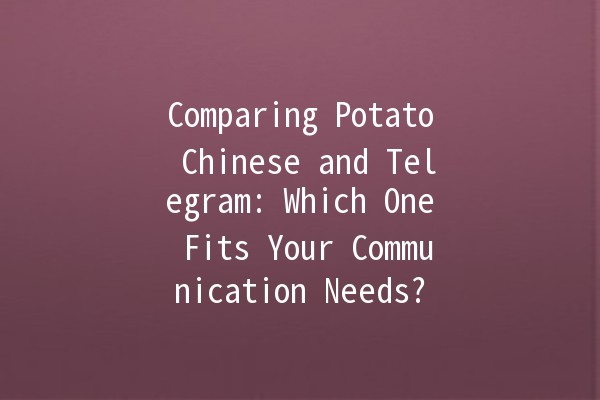In the world of digital communication, platforms and applications are continuously evolving to meet the needs of users. In this article, we will delve into an interesting comparison between Potato Chinese (a messaging application with unique features tailored for Chinesespeaking users) and Telegram, a globally popular messaging app known for its robust functionality and security features. Both platforms offer unique advantages and capabilities, but which one is truly better for you? Here, we provide a practical comparison, including five specific productivityenhancing tips that can help users choose the right platform for their communication needs.
Understanding Potato Chinese 🥔
Potato Chinese, often colloquially referred to simply as "Potato," is a messaging platform designed specifically for users who communicate predominantly in Chinese. It boasts several unique features:
Key Features of Potato Chinese
Educational Tools: Integrated learning aids help improve language skills.

Custom Stickers: Users can create and share custom stickers that reflect current trends.
Localized Content: Access to Chinese news, entertainment, and cultural content within the app.
Exploring Telegram 🌐
Telegram is widely recognized for its versatility and advanced features. It continues to attract users from various backgrounds due to its extensive capabilities:
Key Features of Telegram
CrossPlatform Support: Available on multiple platforms (iOS, Android, Windows, etc.).
File Sharing: Allows users to send files up to 2GB, suitable for sharing large documents or media.
Customization Options: Users can personalize their profiles, themes, and chat backgrounds.
Comparative Analysis of Potato Chinese and Telegram 🔍
Potato Chinese: It is tailored for Chinese language speakers, making it easier for users to communicate without language barriers. The educational tools within the app enhance language skills.
Telegram: While it supports multiple languages, it lacks the depth of educational integration that Potato offers to Chinese speakers.
Potato Chinese: Focuses on creating a vibrant community with culturally relevant tools. Users often find it an engaging platform for social interactions in Chinese.
Telegram: Its capabilities for large group chats and channels mean a broader audience but less cultural specificity for Chinese users.
Potato Chinese: Offers strong encryption features but may not have the extensive reputation of Telegram.
Telegram: Known for its superior security measures and privacy options, making it attractive for users concerned about data protection.
Potato Chinese: Enables users to personalize their communication experience extensively, particularly with creative sticker options.
Telegram: Although it offers customization, it may not resonate as well with certain cultural contexts as Potato does.
Potato Chinese: More suited for informal, daily communication, particularly among younger users or language learners.
Telegram: Better for professional use, community engagements, and tasks requiring organization and automation.
5 Productivity Tips When Using These Apps 📈
Tip: Utilize integrated dictionaries and language exercises to improve your communication skills.
Example: Set daily reminders to use the learning features regularly; this will bolster your proficiency in Chinese while chatting.
Tip: Incorporate bots that can assist in scheduling and reminders within your workgroup.
Example: Use a Bot to set up regular checkin reminders or assign tasks to team members conveniently—boosting overall productivity.
Tip: Create or join groups based on your interests or profession in both apps.
Example: Use Potato to engage in groups focusing on cultural topics; this enhances knowledge and fosters connection while using our native language.
Tip: Categorize conversations based on priority in Telegram using archived chats and folders.
Example: Archive less important chats to declutter your interface and focus on more critical communications, thereby organizing your workflow.
Tip: Make use of customized stickers or memes that resonate with your contacts.
Example: In Potato, create personalized stickers for major holidays to add a special touch to your messages, enhancing engagement and relatability.
Common Questions About Potato Chinese and Telegram 🙋♂️
Answer: The primary audience for Potato Chinese comprises young Chinese speakers, language learners, and individuals looking for a culturally engaging communication platform. The app provides tools specifically aimed at improving language skills while ensuring the conversation remains lively and relevant.
Answer: Yes, both Potato Chinese and Telegram prioritize user privacy and security. Potato provides endtoend encryption for its messages, while Telegram is renowned for its advanced security features, including secret chats and regularly updated encryption protocols, making both options viable for users concerned about privacy.
Answer: While Potato Chinese is more suitable for personal and social interactions, Telegram can be effectively used for business communications, thanks to its group functionalities, filesharing options, and bot capabilities, allowing for organized project management and professional interactions.
Answer: Telegram excels in group communication, allowing large groups of up to 200,000 members, which is ideal for community building and professional gatherings. Potato Chinese, while featuring group chat functionality, does not support such vast group sizes, focusing instead on more intimate connections.
Answer: Telegram outshines Potato Chinese with its ability to provide filesharing options of up to 2GB, making it an excellent choice for sharing large documents, videos, or media files easily. Potato's filesharing capacity is limited, focusing more on quick messaging rather than extensive file transfers.
Answer: Yes, Telegram allows users to access their chats from multiple devices simultaneously without needing to be connected to a primary device. Potato Chinese, while available on various platforms, may not seamlessly sync across devices like Telegram does, potentially limiting accessibility.
, deciding between Potato Chinese and Telegram depends largely on your personal or professional communication needs. If you are a Chinese speaker or a learner looking for a culturally rich platform, Potato Chinese might be the better fit. However, if you're looking for broad functionality, automation, and security in messaging, Telegram could be the ideal choice.